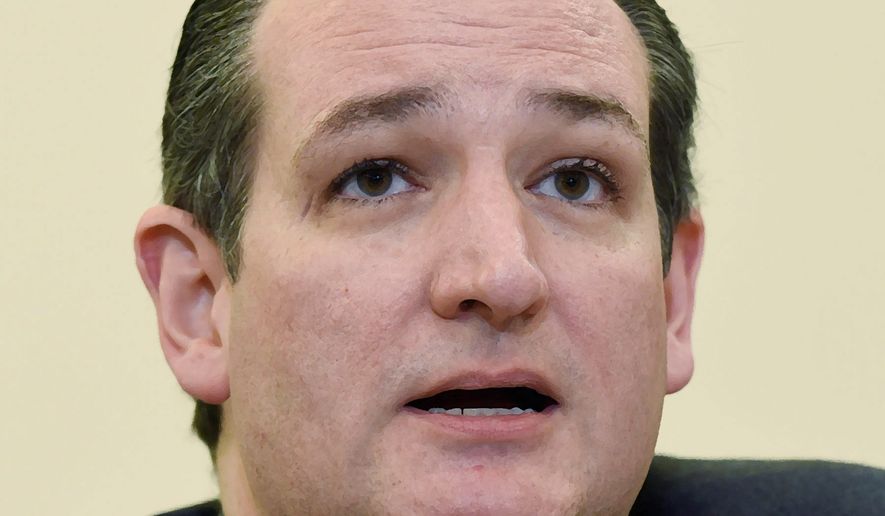OPINION:
In the spring of 2011, I heard about a dazzling young conservative, the former solicitor general of Texas, who was running for a soon-to-be-open U.S. Senate seat. Brilliant and charismatic, he was a Princeton and Harvard Law graduate who seemed to relish rubbing that pedigree in the faces of Ivy League liberals who couldn’t fathom why he wasn’t “one of them.” But Ted Cruz would never be “one of them,” and that gave him the makings of a conservative superstar.
So I invited this political unknown with negligible poll numbers to appear as a guest on my national radio show. One of the first — and most dynamic — candidates to emerge from the then-nascent Tea Party movement, Mr. Cruz spiritedly championed limited government, fiscal responsibility and economic freedom. When I asked if we could trust him to stay true to those principles, he replied unequivocally, “I give you my word. I will fight with everything I have for them and for this great country.”
And he did. He waged so many lonely battles against President Obama, the left, the media and many in his own party — over Obamacare, the debt ceiling, taxes, Mr. Obama’s executive orders, gutting of the military and global retrenchment — that I began tweeting, “Must Ted Cruz do everything?”
He was the original outsider.
That earned him the enmity of those who resented how bad his leadership made them look. But he wasn’t sent to Washington to be a party apparatchik, and he’s remained one of the very few who has staunchly resisted that town’s seductive call to sell out.
Now running for the GOP nomination, he is playing the long game very skillfully. Having already raised substantial money, Mr. Cruz has made the strategically smart decision to establish something of an alliance with another outsider, current poll leader Donald Trump. If Mr. Trump recedes, Mr. Cruz will be best positioned to inherit the significant, passionate anti-establishment vote.
Mr. Cruz is now consistently the top-ranked candidate after the three unconventional candidates, Mr. Trump, Ben Carson and Carly Fiorina. He’s betting that when voters must make a final decision, they will choose a fighter, but the fighter who has actually been in the arena.
I spoke with Mr. Cruz this week about a range of issues, starting with whether he believes that Mr. Obama and the left have succeeded in changing the very nature of America. “They have certainly tried and not without some success,” he replies. “But I am deeply optimistic that we can reverse that trend. But here’s the good news, I think that a great majority of Americans want to stand on their own feet. And they will if they are empowered to do so.
“We do that by creating a fairer, flatter tax code, putting an end to stifling regulations that hinder innovation and job creation like Obamacare, and returning power from Washington back to the people.”
How would he wage his longstanding fight against the entrenched ruling class differently as the chief executive?
“Leadership starts at the top,” he says. “And once we have a commander in chief that fights for the interests of the people instead of the Washington cartel — the career politicians in both parties, who are in cahoots with lobbyists and special interests to maintain their own power — we will finally see change in Washington.
“But we will not break the Washington cartel without a mandate from the people, and a leader willing to follow that mandate. Once that happens, it will be more politically risky for the politicians in Washington to do the wrong thing than to do the right thing.”
I also asked this constitutional lawyer how he would reconcile defending our rights and freedoms while fighting a religiously-based enemy — the Islamic State, al Qaeda and the Muslim Brotherhood — that uses those liberties to destroy us.
“Religious liberty is the first liberty protected in the First Amendment; it is foundational to every other liberty,” he says. “But Americans are not fooled by those hiding behind the perversion of religion to promote death and violence across the globe. I think we need to see this enemy not in terms of religion, but in terms of a vicious, totalitarian ideology that is the radical Islamism espoused by the groups you name.”
After citing Egyptian President Abdel-Fattah el-Sissi and King Abdullah of Jordan as Arab leaders the United States should be supporting in this fight, Mr. Cruz turns his attention to protecting the homeland:
“I’m proud to have sponsored legislation in the United States Senate that would revoke U.S. citizenship from any American fighting for or supporting ISIS or other designated terrorist group. If you go fight for ISIS, you are essentially signing your death certificate, and you will under no circumstances be returning to our homeland. Those actively promoting the views held by radical Islamic terrorists who seek to destroy everything that is foundational to America must be stopped, and under my administration they will be.”
Mr. Cruz may be in a race with 16 other candidates, but as usual, he stands a world apart. Proud of the battle scars he’s earned trying to restore America, he charges ahead with Churchillian defiance. And like Churchill, Mr. Cruz runs the political table strategically, with precision — and doesn’t believe in surrender.
• Monica Crowley is online opinion editor at The Washington Times.




Please read our comment policy before commenting.